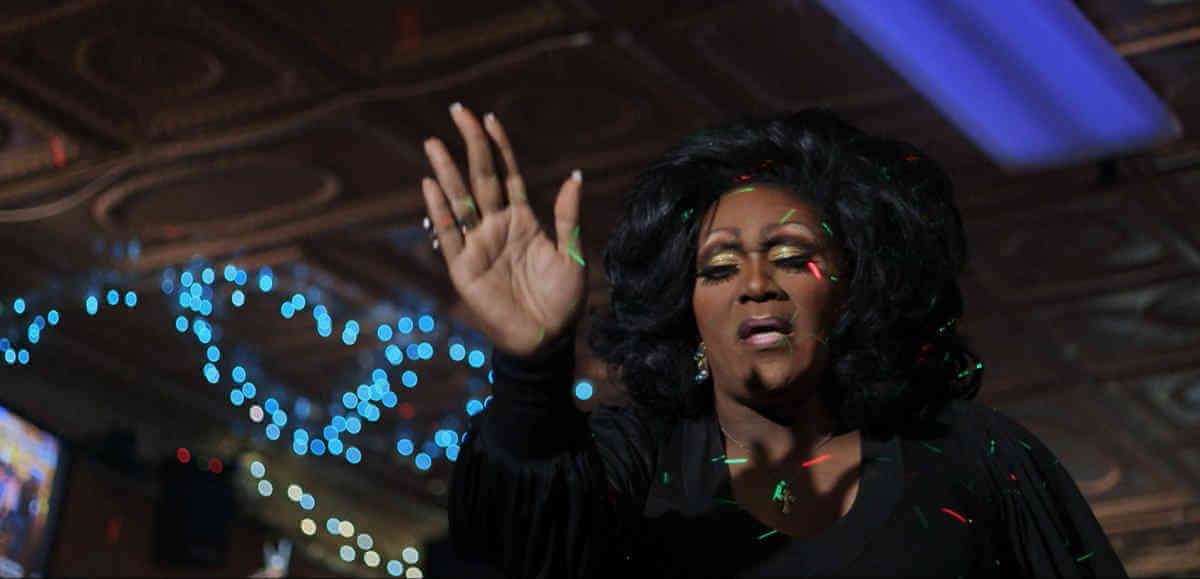“The Gospel of Eureka” is out gay filmmakers Michael Palmieri and Donal Mosher’s engaging and even-handed documentary about Eureka Springs, Arkansas, which narrator Mx. Justin Vivian Bond describes as, “a place where stories come to life.”
This small town is home to the Christ of the Ozarks, the largest statue of Jesus Christ in North America. But, as this lyrical film shows, the town is also home to the Eureka Live Underground bar where drag queens lip-synch to gospel songs. The filmmakers juxtapose the gay bar’s entertainment with performances by Christian folks involved in the town’s production of “The Great Passion Play,” a dramatic reenactment of Christ’s last days. That show is performed for roughly 50,000 visitors a year.
“The Gospel of Eureka” presents the story of a town where people of disparate beliefs live side-by-side in peace even as a battle is carried out over a proposed legislation to protect LGBTQ people from discrimination and ensure transgender people access to bathrooms consistent with their gender identity.
In a recent phone interview, Palmieri and Mosher spoke about “The Gospel of Eureka” and what they learned about life in this small town.
GARY M. KRAMER: “The Gospel of Eureka” is expanded from your 2016 short, “Peace in the Valley.” How did you discover Eureka Springs and its stories and come to make two films about this town?
MICHAEL PALMIERI: We were commissioned to make the short in the region with [the documentary producer] Field of Vision, but we knew there was a larger feature there. So, we continued filming to explore what was hinted at in the short in a broader context. It was always our intention to make the longer piece, the short just got us there.
KRAMER: I assume the interviewees knew you are both gay and where your sympathies lied. How did you gain their truth and get them to tell their stories?
DONAL MOSHER: As soon as I step foot anywhere, I’m read as gay. Randall [CEO of “The Great Passion Play”] knew. I didn’t speak of it and he didn’t speak it — we were addressing each other for the film. Kent, who played Jesus, understood us both as gay and had intuition of the intentions we were going for, but it was never mentioned. At the Eureka Underground, we had access to that community. Depending on whom you were talking to, nothing was hidden but not everything was spoken either. Everyone had an understanding of what we were doing with the film.
PALMIERI: I think talking about this stuff and being openly gay sets the table a bit. It makes it easier for access to certain people. The Evangelicals in the film were open and accepting and had a dialogue with us. They knew who they were speaking to.
KRAMER: The film provides a nice sense of time and place and history. How much research did you do and what did you discover being there?
PALMIERI: On one level, you learn about the place when you’re there. We knew about Anita Bryant, but once we found out she tried to revive her career in Eureka we had to work it into the film. There’s so much history there. We couldn’t work it all in.
MOSHER: The history of the town is told to you by the people who live there. We spent a lot of time with an 80-year-old blind woman who knew the region’s history.
KRAMER: Do you think your film breaks or reinforces stereotypes about Christians, the Ozarks, and the LGBTQ community? Who or what surprised you?
MOSHER: Our intention was not to reinforce the stereotypes. Jayme Brandt was the most surprising character — you’d expect from his Christian shop that he’d be a conservative Christian. But that was not the case at all. There are so many easy stereotypes about the South and Christianity, etc., that it was a tricky balance. These are people being indoctrinated to a religious system that can turn against [LGBTQ] rights. But that same system can build communities. There are enough negative representations that we could balance it out.
PALMIERI: What is important in the way this film works is that we are showing stereotypical things and non-stereotypical things. When you see Randall, you think we are making fun of Evangelical Christians, but it goes deeper, so there’s more than you initially imagine. Likewise, the kid holding the sign against the 2223 ordinance who can’t answer the question asked to him is a stereotype of dumb people in the South. But it’s not that simple. What is dramatic about the kid with the sign is that he’s clearly there without knowledge of what he’s doing. That makes me sad. I have sympathy for him. It’s painful because he’s becoming aware that he’s not fully aware. That can make you mad, but it’s also weirdly funny. The film works on these levels because the images are complicated.
KRAMER: I like that you juxtapose the dress up and performances of passion players and the drag queens. Did they make those same connections?
PALMIERI: The town didn’t think of these connections as bluntly as we placed them. It’s a tourist, performative town, but we use the gospels as a means, as the baseline, to examine both sides of the issue to see where we end up.
MOSHER: The drag queens have the upper hand because they understand ‘The Passion Play,’ especially if they’ve seen it or had contact with it. It’s a performative thing. But the people in ‘The Passion Play’ won’t consider it a drag show.
We’re trying to be as clear as we can to articulate each subject’s point of view. For us, camp can be comical. It can be sacred and profane — and that’s what we wanted to get at.
THE GOSPEL OF EUREKA | Directed by Michael Palmieri and Donal Mosher | Kino Lorber | Opens Feb. 8 | Quad Cinema, 34 W. 13th St. | quadcinema.com



































